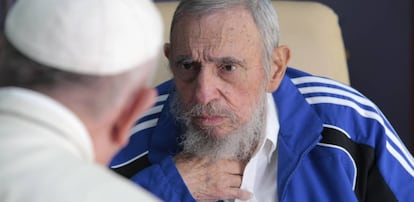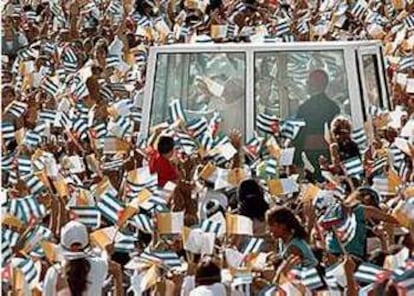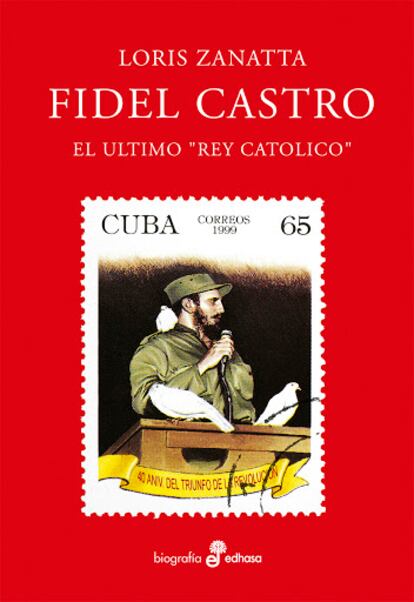Fidel Castro, the last Catholic monarch
The Italian historian Loris Zanatta tracks the religious and moral roots of the evangelizing speeches of the Cuban leader, his official iconography and his glorification of the poor

When Pope Francis visited the leader of the Cuban revolution, Fidel Castro, he gave him a book and records containing the sermons and reflections of Armando Llorente, a Spanish Jesuit priest who worked at the school that Castro had attended. This priest was later expelled by the revolution and forced into exile in Miami in 1961, but before dying, he wished to absolve Castro. The pope’s biographer, Austen Ivereigh, was enthusiastic about the pontiff’s gifts to the Cuban leader, as they were meant for the latter to reconcile himself to his own Jesuit past.
It was not necessary: Fidel Castro never ceased being a Jesuit, instead adapting the religious and moral matrix of this Catholic order to Marxism-Leninism, and causing endless confusion to the Soviets. This is the theory behind Fidel Castro, l’ultimo “re cattolico” (or, Fidel Castro, The last “Catholic king”), a book published by the Italian historian Loris Zanatta and now also available in Spanish. In it, Zanatta amply demonstrates how Fidel Castro appropriated terms from religion and the morality of sacrifice to earn heaven, summed up in one of the Cuban leader’s most-repeated phrases: “Man must be repressed in order to be saved.”
This idea captured the imaginations of the Nicaraguan priest and poet Ernesto Cardenal and of the dominican friar from Brazil Frei Betto, Castro’s friend and biographer, who saw in the leader of the Cuban revolution a crusader for Christianity: it is enough to take a close, unemotional look at his revolutionary liturgy, at his extremely long, evangelizing speeches, and even at the official iconography depicting him with doves flying around his body, more reminiscent of the Catholic images of saints than of a commander who preached redemptive violence.

In his extensive, rigorous essay, the historian unpicks the most powerful ideological myth of the Latin American left, exposing Fidel Castro’s Hispanic roots steeped in a Catholic nationalist tradition, the idea of the cross imposed by the sword, and the contempt for secular liberalism that still endures in today’s populist movements under the guise of 21st-century socialism. Religion-infused politics and popular religious sentiment that morphed into ideological faith were the basis for authoritarian regimes that made liberal democracy seem like an exotic greenhouse plant, alien to Latin America’s autocratic tradition.
Zanatta has penned several books on what he knows best: Argentina’s Peronism and national catholicism, religion and popular faith as the ideological foundations for the personalist and authoritarian leaders known as caudillos. This time around, Zanatta has tackled a colossal biography about one of the unavoidable figures of the 20th century, a task to which he has devoted years of study. Although Castro has been widely studied already, this was an advantage as a historian’s primary source of material are sources, and libraries are full of them. Yet the most important sources, the Cuban ones, are closed off to any researcher who does not contribute to reinforcing Castro’s myth.
Zanatta did not allow himself to get carried away by the charisma of a character who was “the first self-historian,” and he says that the title of his book anticipates something that should not be so surprising: that “the communist monarch of the 20th century is heir to the ideal of past monarchs. He grew up on an island that was [part of] Spain for centuries, in a family and social setting that was Hispanic and Catholic.” Castro was educated by priests and taught the principles of communitarianism of the Jesuit missions. This legacy permeated his moral universe: the salvation of souls through ideological evangelization, the “new man” breathed into creation through revolutionary action and discipline, communism’s society without classes, and the redemption of the chosen people by its messiah-saviour. The analogies between Castro’s society and Christian societies emerge from a meticulous and absorbing journey through the life of Fidel Castro and Cuban society, “where the individual is subjected to the collective over which the Church watches, or in this case, the party that guarantees orthodoxy and the unity of the faith. And sitting above all this is the King, Castro himself, invested with temporal and spiritual powers.”

On this historical journey, Zanatta finds features that are common to many Latin Catholics who, like Castro did, detested the democratic values and practices of Anglo-American liberalism, blamed by the leader of the Cuban revolution for causing “the moral fractures of the world” in a claim that is being repeated these days by new populisms in the region. This cultural permanence showcases the relevance of this book at a time when Cuba is exporting its failed socialist model and the continent is renewing the debate around democracy, now under threat from autocratic systems and electoral populisms.
It is an immense essay that will shock both the devout followers of Castro, because of the Hispanic and Catholic legacy associated with the Marxist-Leninist icon, and the anti-Castro activists who fought his communism, and who will not feel comfortable to see him depicted as a Catholic monarch. Yet a dispassionate reading offers elements that were always there within reach of rational understanding, but always discarded on the emotional strength of ideological self-delusion, despotism, sexual morality, the glorification of the poor because of the purity of their souls – as a way to justify the economic failure of the revolution – contempt for democracies and his support for armed guerrillas on the continent.
This is a disturbing book for those of us who were in our twenties in the 1970s and fell under the spell of the Cuban revolution. After the hangover of the exiles, the deaths and the disappearances, we were forced to learn the value of living in what revolutions despise: liberal democracies. Today, we look with perplexity at the new generations who were educated in freedom and who are now rewriting history, denying the violation of human rights in Venezuela and glorifying the armed guerrillas promoted by the Castro regime, as Zanatta shows, only with “facts” and with Castro’s extensive speeches.
Norma Morandini is an Argentine journalist and writer. She was elected to Argentina’s Chamber of Deputies and to the Senate.
English version by Susana Urra.
Tu suscripción se está usando en otro dispositivo
¿Quieres añadir otro usuario a tu suscripción?
Si continúas leyendo en este dispositivo, no se podrá leer en el otro.
FlechaTu suscripción se está usando en otro dispositivo y solo puedes acceder a EL PAÍS desde un dispositivo a la vez.
Si quieres compartir tu cuenta, cambia tu suscripción a la modalidad Premium, así podrás añadir otro usuario. Cada uno accederá con su propia cuenta de email, lo que os permitirá personalizar vuestra experiencia en EL PAÍS.
¿Tienes una suscripción de empresa? Accede aquí para contratar más cuentas.
En el caso de no saber quién está usando tu cuenta, te recomendamos cambiar tu contraseña aquí.
Si decides continuar compartiendo tu cuenta, este mensaje se mostrará en tu dispositivo y en el de la otra persona que está usando tu cuenta de forma indefinida, afectando a tu experiencia de lectura. Puedes consultar aquí los términos y condiciones de la suscripción digital.









































